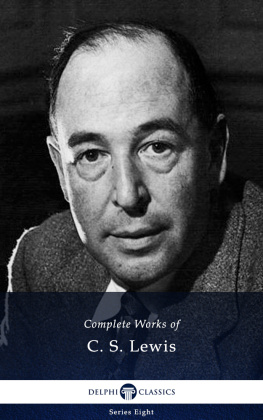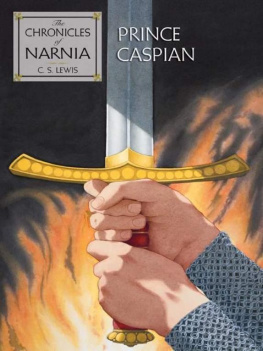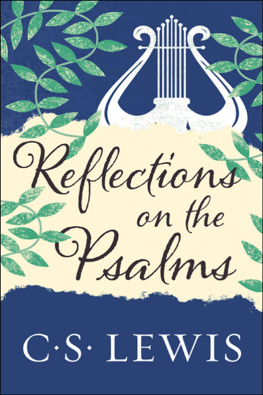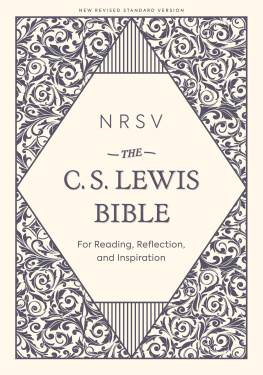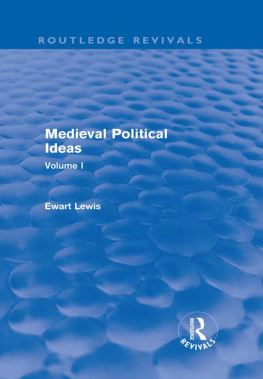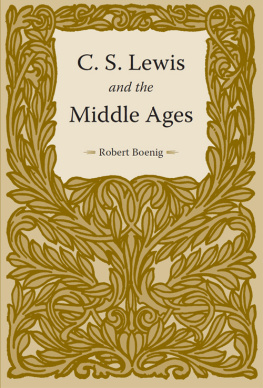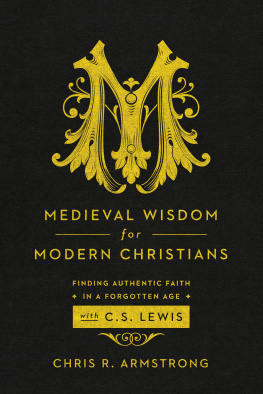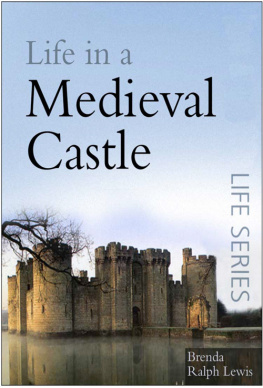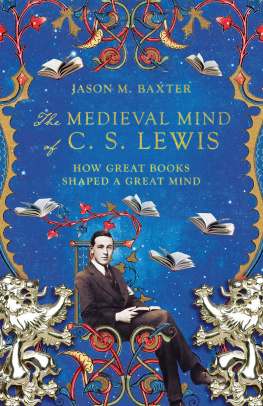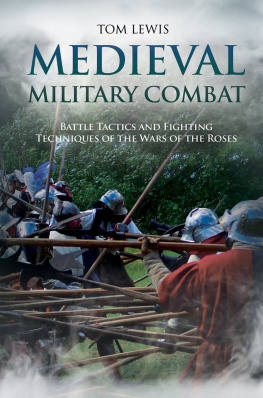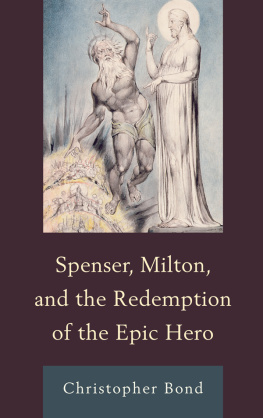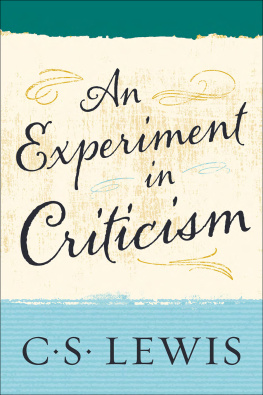CONTENTS
When Professor C. S. Lewis died on 22 November 1963, he left few unpublished manuscripts; and that in spite of the astonishing fertility of his pen. He managed throughout his life to meet publishers dead-lines and see most of his works in print. As I had become Lewiss private secretary before his retirement from Cambridge, his brother, Major W. H. Lewis, has kindly allowed me to publish his literary remains.
Many people will have heard Lewis read papers which have not appeared in print. I note in his pocket diaries the numerous occasions for which he prepared learned addresses. Yet so few survive today. This is because those manuscripts which he did not intend to publish immediately were often turned over and used for writing other books and essaysall in his tiny, beautifully regular handwriting. And, as Lewis habitually kept his desk-tops tidy, they usually ended in the wastepaper basket. Several of the studies in this volume, such as the one on Tasso, survive, I suspect, only because they burrowed their way into his college filesseveral large desk drawers into which he threw used envelopes and odd memoranda. Yet the fertility of his genius allowed him to throw so much away, and still to publish an extraordinary number of books, essays, poems and book reviews, as can readily be seen from my bibliography of his writings in Light on C. S. Lewis (1965). This present volume is composed of all the studies in medieval and renaissance literature I have been able to find and which Lewis, for various reasons, never published in his lifetime. I have also chosen to reprint seven related essays which are difficult for some readers to come by. The order in which I have placed the pieces this volume contains is the chronological order of the subjects they discuss.
De Audiendis Poetis was written as an introductory chapter to a book Lewis began several years before his retirement. Some of it recalls passages in his essay The Anthropological Approach as well as parts of The Discarded Image. Yet the aim of this book is not like that of either work; it is, as he says, to cure errors of misapprehension and even in this single chapter his purpose is clear.
Again, in The Genesis of a Medieval Book, we have only the first chapter of a proposed work. His first subject is Laamons Brut , which was becoming increasingly dear to Lewis. This is one of the last pieces he wrote. He knew that the Early English Text Society edition of the Brut was in preparation, but had to rely on Maddens edition of 1847. Rather than replace his quotations with those of the E.E.T.S. edition so far available, I have decided to print Lewiss study just as it stands.
The two consecutive lectures, Imagination and Thought in the Middle Ages, amount almost to a prcis of The Discarded Image. Lewiss approach is not the same, however, and herein lies the differencethese lectures were specially prepared for, and delivered to, an audience of scientists at the Zoological Laboratory, Cambridge, on 17 and 18 July 1956. Instead of emphasizing the literary sourcesthese he hardly mentionsLewiss purpose was to construct a clear and simple image of the universe as the men of the Middle Ages understood it. It is, in fact, a map for those who want to see their way about, but who have read no medieval literature and for whom even a longer introduction would be a surfeit.
Dantes Similes was read to the Oxford Dante Society on 13 February 1940 and Imagery in the Last Eleven Cantos of Dantes Comedy was read to the same society on 9 November 1948.
Dantes Statius is reprinted from Medium Aevum ( XXV , no. 3, 1957) with the permission of the editors.
The Morte Darthur is an unsigned review (7 June 1947) of Professor Vinavers Works of Sir Thomas Malory , reprinted by permission of The Times Literary Supplement. Judging from the handwriting, I should guess that Lewis wrote the essay on Tasso in the 1940s.
It is to Harcourt, Brace and World Inc. that I owe permission to reprint Edmund Spenser, 155299 which originally accompanied Lewiss selections from The Faerie Queene and Epithalamion in Major British Writers (vol. I , 1954). In his correspondence with the late William Borst, editor of the Harcourt, Brace and World college department, Lewis speaks of his own satisfaction with the article and his concern that readers should remember that Spenser is primarily a romancer longue haleine. Students, he complains, are too carefully shielded from the rumour of worlds they have not yet broken into by being led to read only the dear old show-pieces from The Faerie Queene , selections which leave the reader content to adventure no further. In his own choice of selections Lewis attempts to quarry from the poem those passages which he feels reproduce its real characteristics: leaving the first appearances of characters as unprepared as Spenser leaves them. As a consequence, one is tantalized and asks for more. With this in mind, one can better appreciate Lewiss discussion of what he calls polyphonic narrative in the essay reprinted here. On Reading The Faerie Queene was originally entitled Edmund Spenser and is reprinted by permission of the Oxford University Press from Fifteen Poets (1941).
Neoplatonism in the Poetry of Spenser is a review-essay of Dr Robert Ellrodts book of the same title and is reprinted from Etudes Anglaises ( XIV , no. 2, 1961) by permission of its editors. I include it here because, as with all of Lewiss reviews, his own contribution is noteworthy. There is certainly a marked similarity between some of his most recent thinking about Spensers poetry (as I see from his Cambridge lecture notes) and his criticism of Dr Ellrodts book. And, judging from my conversation with Lewis, I gather that, had he enjoyed a longer retirement, he might have written a book-length study of Spensers poetry based on his Cambridge lectures. Happily, there does survive a further draft of one passage from his notes. It is Spensers Cruel Cupid, a study of Faerie Queene , III , xi, 48 which Lewis was discussing with Dr Alastair Fowler a few months before his death. Lewis himself spoke of the piece as exemplifying an iconographical approach which he was finding fruitful with Spenser.
Genius and Genius is reprinted from The Review of English Studies ( XII , no. 46, 1936) by permission of its editors and A Note on Comus is reprinted from the same source ( VIII , no. 30, 1932) by permission.
I mentioned desk- tops above. Lewis could write anywhere, even when conditions were unfavourable. During term he usually worked in his college rooms, but on vacation and week-ends he wrote in one of his two studies at The Kilns, his home in Oxford. As could be expected, his papers were in no particular order: I found the pages of Spensers Cruel Cupid in three different places. This arrangement also meant that part of Lewiss library was invariably in the other place. He almost always quoted from memory; I have compared the quotations in these studies with the texts he used and have needed to make a number of minor corrections. As Lewis did not himself prepare these papers for publication, I have used my judgement also in correcting and regularizing the spelling and punctuation.
We all wonder, I suppose, what Lewis would have written had he lived longer. I spoke of the two introductory chapters in this volume and of Lewiss growing delight in the Arthurian legend. This brings me to his plans for retirement. Lewis asked several times what I should like him to write. I wanted him to finish his novel on Menelaus, but he could not see his way after the first few chapters. Then I suggested that he might do a translation of Laamons Brut : this he liked, although it meant, he said, waiting for the new E.E.T.S. edition to appear. Meanwhile he had other ideasand here I hope I shall be forgiven for digressing a little.


